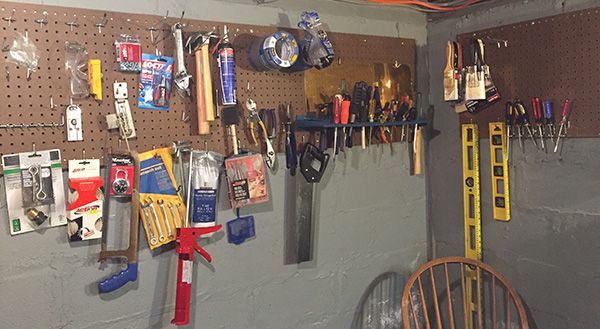Hard Question for the Handyman
by Bob Incollingo
I called my friend to help me hang a pegboard for my tools. He had hung his own pegboard, and I had admired it for a long while. My friend's pegboard is an organized thing of beauty. He came over to help, and now my new pegboard is an organized thing of beauty, too.
My friend is good with tools, and his pegboard helps him to get things done. I’m not so good with tools. My pegboard is a kind of picture frame for a tool collection.
What should you do if you don’t have a friend like mine? You might ask around for someone who knows a handyman, check the bulletin board at the car wash, or look online. It can be tricky to spell, but the word “handyman” is a nice reassuring word that you associate with other words like “craftsmanship,” and “workmanlike,” and (best of all) “inexpensive.” Hire a handyman to fix your problem, if you can find one who's registered.
If you hire an unregistered handyman, you might get a new problem. Under New Jersey law, a handyman is a home improvement contractor, and must register with the government. The Contractors’ Registration Act (N.J.S.A. 56:8-136 et seq.) has been the law since the last day of 2005 and since then, no one is allowed to “offer to perform, or engage, or attempt to engage in the business of making or selling home improvements unless registered with the Division of Consumer Affairs…”
It doesn’t matter if the person is doing repair jobs part time, on the side, or moonlighting, or is retired, or is coming across the river from another State, or for any other reason that isn’t an approved exception set out in the Act. The approved exceptions include home improvement on a residential or non-commercial property the person owns, or that is owned by a member of his family, a bona fide charity, or other non-profit organization. There are other exceptions, but registration is the general rule.
It doesn’t cost a lot to register as a home improvement contractor, but there are forms to fill out and a fee to be paid, and review and approval of the application by the Division of Consumer Affairs. The application requires disclosure of criminal history, but a spotty record doesn’t necessarily bar a person, especially if the convictions don’t involve dishonesty or moral turpitude. To be accepted, the contractor applicant needs to buy and maintain liability insurance.
There is no written test, no apprenticeship or educational requirement, and no experience necessary, so registration as a home improvement contractor does not guarantee ability, as you might expect with an electrical contractor or plumber who must be licensed to work in their trade. A home improvement contractor registration is like a car registration - having one doesn’t mean you know how to drive.
Registration means a handyman is legal, that he or she can be expected to carry commercial general liability insurance to answer for damage done, and has something to lose if he or she commits consumer fraud on a customer. All things being equal, you would have a higher level of comfort letting them into your home.
Without registration, by contrast, a handyman commits a crime by working for you. N.J.S.A. 56:8-146. If things go badly, you may look in vain for the unregistered contractor’s liability insurance policy, or worker’s compensation coverage, or even car insurance for the business. For larger projects where a permit is required, an unregistered handyman can not get you a municipal permit for his work. Lack of registration should warn you that your handyman is willing to cut corners, which is the very last thing you want in a handyman.
Before hiring a handyman, ask the hard question. Ask him for his registration number, which also ought to be displayed on his truck. Don’t accept a taxpayer identification number or social security number, but confirm that what you are provided starts with “13VH0” and adds another seven numbers, and check on the New Jersey Division of Consumer Affairs website. Do keep in mind that some registrations are issued in the name of the business, not the individual. Don’t hire an unregistered contractor to work on your home.
New Jersey construction lawyer Robert J. Incollingo is a Director of the Camden Business Association. His comfort with tools extends no further than spell check. More articles like this appear on RJILAW.com, but this is the only one dedicated to his friend Jim.
